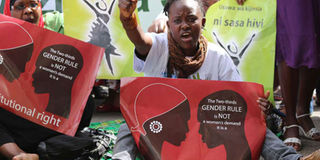We should all support gender equality

Activists in Mathare, Nairobi, on July 31, 2015 call for Parliament to implement the gender rule. Kenya must do the right thing and give women equal chances. PHOTO | NATION MEDIA GROUP
What you need to know:
- Lack of women in political office and other positions of power contributes to their vulnerability.
- Women constitute over 50 per cent of the population, but they are visibly absent in leadership.
- Customary law, illiteracy and many other barriers hamper women’s rise to political leadership.
The debate on the woman representative position and whether it should be retained or scrapped should concern all Kenyans.
The disquiet and arguments against the reserved seats for women Members of Parliament is in total disregard of the gender injustices in the country, and how male domination, among other factors, stifles women’s performance and progress.
With only 20 per cent female MPs, Kenya ranks 76th among the top 100 countries, according to the World Classification of Women in National Parliaments, well behind Rwanda and Uganda, where women occupy 56 per cent and 30 per cent, respectively.
Truth be told, Kenya has made some impressive strides in gender equality in recent years.
AFFIRMATIVE ACTION
However, the struggle for gender equality is still far from won, and any attempts to reverse the gains that have accrued over the years must be resisted.
Lack of women in political office and other positions of power contributes to their vulnerability, and negatively impacts on development.
While recognising the shortcomings and mistakes that some women representatives might have made, we should assess performance in light of the many years of exclusion, and the political and legislative environment.
Failure of some of women representatives elected in 2013 should not be used to pull down the affirmative platform.
HURDLES
Affirmative action is a good way to correct years of disparities in power, resources and prestige and the exclusion (culturally, socially and economically) of women.
Women constitute over 50 per cent of the population, but they are visibly absent in leadership.
Women are underrepresented in decision-making positions.
Customary law, illiteracy and many other barriers hamper women’s rise to political leadership, and restrict their contributions to Kenya.
As former US President Barack Obama once said, and rightly so, we cannot win if half of the team is not playing.
ROLE OF IEBC
To make progress, Kenya must involve women in every sphere; socio-economic and political.
We must support women to exercise their constitutional rights and empower them to play their role in realising the promise of the 2010 Constitution.
Parliament has failed to enact laws to ensure that the gender rule is implemented in the 2017 elections.
And so, we are left wondering how to get more women into leadership positions.
More introspection is needed. The Independent Electoral and Boundaries Commission (IEBC) asserts that it has neither powers nor mechanisms to ensure that political parties adhere to the two-third gender rule, especially in nominations.
However, it is critical for the IEBC to provide a framework and advise parties on how to realise the two-third-gender rule.
MERITOCRACY
It should also monitor and evaluate whether the parties are making efforts to implement the two-third-gender rule.
Making nomination fees affordable for women is necessary, desirable and achievable.
However, the nomination of women should be based on merit, and not only gender.
We must take firm action against people who use violence to intimidate and discourage women who offer themselves for elective positions.
Most importantly, women must realise that men can be partners in the search for gender equality.
Elected and nominated women must work hard to fulfill expectations.
MENTORSHIP
Additionally, women in leadership must mentor others, especially girls, to rise to the highest levels.
Ultimately, Kenya must do the right thing and give women equal chances.
We will not create a better country until women are effectively involved in all the spaces - economic, social, cultural and political.
Mr Obonyo is the author of Conversations about the Youth in Kenya. Email: [email protected]





